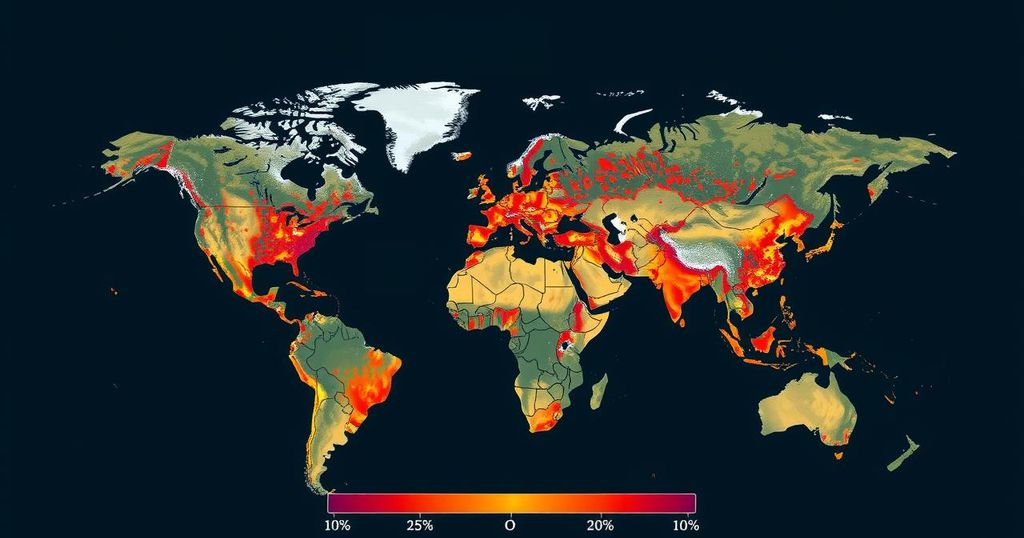Climate change may contribute to about one-fifth of the current dengue cases globally, with projections indicating an increase of 40-60% by 2050, according to a study by Stanford and Harvard researchers. Rising temperatures are directly linked to higher infection rates, posing significant health risks, especially in countries entering the optimal virus transmission temperature range. Immediate action is suggested to mitigate these impacts through emissions reductions.
Recent research indicates that climate change may be responsible for approximately one-fifth of the current global dengue fever cases, with projections suggesting a potential increase in instances of the disease between 40 to 60 percent by the year 2050. This study, conducted by researchers from Stanford and Harvard Universities, emphasizes the link between rising temperatures and the growing incidence of dengue, marking climate change as a significant driver of mosquito-borne diseases worldwide. The study’s findings were shared during the Annual Meeting of the American Society of Tropical Medicine and Hygiene. “We examined data regarding dengue incidence in correlation with climate variations across 21 countries in Asia and the Americas, establishing a direct association between increasing temperatures and heightened infection rates,” explained Erin Mordecai, the study’s senior author and an infectious disease ecologist at Stanford University. The authors noted that historical climate change has already escalated dengue incidence by 18 percent in the analyzed regions, with estimates suggesting potential increases of up to 200 percent in certain areas due to climate factors. According to the World Health Organization, the warmer and more humid climatic conditions exacerbated by climate change are facilitating the dissemination of dengue, resulting in new outbreaks in previously unaffected regions, including parts of Europe and the Eastern Mediterranean. In the Americas, there were nearly 12 million dengue cases recorded in 2024, a substantial increase from 4.6 million cases in 2023. The study also highlights that countries like Vietnam and Cambodia are among the Asian nations affected. Mordecai reiterated, “This evidence underscores that climate change has evolved into a significant threat to human health, particularly concerning dengue. Our data suggests that the impact of this threat could escalate in the future.” Furthermore, regions now exhibiting the optimal temperature range for the virus (20-29°C) could face the most considerable risks, with predicted infection surges of 150-200 percent in areas of Peru, Mexico, Bolivia, and Brazil. Conversely, regions at the high limit of the temperature spectrum, such as southern Vietnam, may see little to no additional climate effects and might even experience a slight case decline. The analysis concludes that over 257 million individuals reside in areas where climate change could potentially double the incidence of dengue within the next 25 years. Notably, the study may underestimate the overall threat to dengue transmission, particularly in regions with inconsistent infection tracking, such as sub-Saharan Africa and South Asia. The researchers recommended significant emissions reductions as a viable strategy to mitigate the effects of climate change on dengue’s spread. They found that with serious emissions cuts, areas currently projected to see a 60 percent rise in dengue cases might instead expect about a 40 percent increase by 2050. Nevertheless, the study asserts that despite even the most optimistic emissions scenarios, 17 of the 21 countries analyzed would likely still encounter climate-related dengue increases.
The background of this study highlights the alarming relationship between climate change and the resurgence of diseases historically linked to rising temperatures, particularly dengue fever. With an increase in global temperatures due to climate change, the conditions conducive to mosquito breeding and the transmission of the dengue virus have intensified. The importance of this research lies in its implications for public health, as rising dengue cases are foreseen in regions that have not previously been impacted, thereby affecting millions and stressing healthcare systems globally.
In conclusion, this study provides compelling evidence that climate change substantially contributes to the rising incidence of dengue fever, already accounting for a significant portion of current cases and projecting future increases. With the possibility of dramatic regional increases in cases, the findings underscore the urgent need for climate action and public health preparedness. The research serves as a critical reminder that climate change poses direct threats not only to environments but also to human health, necessitating immediate global responses to mitigate its effects.
Original Source: www.theweek.in






